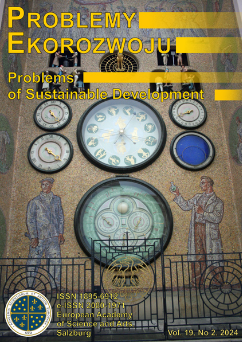Local Currencies as an Instrument for Implementing the Concept of Sustainable Development
Magdalena Miszczuk
Lublin University of Technology, Faculty of Management, Department of Finance and Accounting, 38 Nadbystrzycka Street, 20-618 (Poland)
Abstract
The concept of sustainable development is multifaceted and multithreaded, thus, it inspires many researchers both in terms of the theory and methodology, as well as regarding its application. The presented article is placed in the latter approach. The main aim of the paper is to analyse the possibilities of the use of (resurging in the 20th and 21st centuries) local currencies for sustainable development, especially in respect of: alleviating poverty and reducing social exclusion, promoting stable, sustainable, and inclusive economic growth, diminishing discrepancies within and amongst states, making cities and human districts more secure, stable, sustainable, and favourable for social inclusion, assuring patterns of sustainable consumption and production. Apart from that, the criticism of the state money, included in the Club of Rome’s report, encouraged the author to set another goal, i.e. to examine whether a local currency is a better instrument for sustainable development than state money.
The aims of the paper are supported by the analyses of three case studies of local currencies, i.e.: Palmas (Brazil), NuSpaarPas (Netherlands), and Zielony (Green, Poland). All considerations are set against the background of general trends regarding the development of currency systems and the evolution of money functions, as well as foreign and local experience connected with the existence and evolution of the local currencies.
Keywords:
money, local currency, sustainable development, Palmas, NuSpaarPas, Zielony (Green)References
ALTERNATIVE CURRENCIES, 2014, Houses of Parliament, Parliamentary Office of Science & Techology, POSTNOTE No. 475, p. 1-5.
Google Scholar
BACSI J., TAKACS I., 2014, Local curriences in the rural economies, in: Roczniki Naukowe Stowarzyszenia Ekonomistów Rolnictwa i Agrobiznesu, 3, p. 19-24.
Google Scholar
BLANC J., 2011, Classifying ‘CCS’: Community, complementary and local curriences’ types and generations, in: International Journal of Community Currency Research,15 (D), p. 4-10.
Google Scholar
DAVIES G., 2002, A History of Money From Ancient Times to the Present Day, University of Wales Press, Cardiff.
Google Scholar
FWIE, 2010, Dobre praktyki w zakresie lokalnej współpracy międzysektorowej na rzecz ekorozwoju, Fundacja Wspierania Inicjatyw Ekologicznych, Kraków.
Google Scholar
GALBRAITH J.K., 1982, Pieniądz – pochodzenie i losy, PWE, Warszawa.
Google Scholar
GERUZEL-DUDZIŃSKA B., 2015, Przypadek Banku Palmas z Brazylii jako sposób na walkę z lokalnym kryzysem XXI wieku, in: Contemporary Economy. Electronic Scientific Journal Vol. 6 Issue 4, p. 69-77.
Google Scholar
HAIŻAK E., 2006, Regionalizm w stosunkach międzynarodowych, in: Stosunki międzynarodowe. Geneza, struktura, dynamika, eds. Haliżak E., Kuźniar R., Wydawnictwo Uniwersytetu Warszawskiego, p. 269-296.
Google Scholar
HUBBARD R.G., 2008, Money, the Financial System, and the Economy, Pearson Education, Inc., Boston.
Google Scholar
LIETAER B., ARNSPERGER Ch., GOERNER S., BRUNNHUBER S., 2012, Money and Sustainability: The Missing Link, A Report from The Club of Rome, Triarchy Press, Charmouth.
Google Scholar
ŁUKASIEWICZ-KAMIŃSKA A., 2014, Waluta alternatywna jako dobro wspólne, in: Myśl Ekonomiczna i Polityczna, 4, p. 206-218.
Google Scholar
MANKIW N. G., TAYLOR M. P., 2011, Makroeconomics, second edition, SOUTH-WESTERN CENGAGE Learning, Hampshire.
Google Scholar
MARTIGNONI J., 2012, A new approach to a typology of complementary currencies, in: International Journal of Community Currency Research,16 (A), p. 1-17.
Google Scholar
PIOTROWSKA A., 2014, Bitcoin a definicje i funkcje pieniądza, in: Annales UMCS sec. H., vol. XLVIII, 2, p. 275-283.
Google Scholar
POZZEBON M., CHRISTOPOULOS T.P., PEERALY J.A., SALDANHA F.P., 2014, The Expansion of Community Banks in Brazil: Discovering Palmas’ Methodology, in: Revista Brasiliera de Casos de Ensino em Administração, Vol. 4, 2, p. 1-20.
Google Scholar
REGIOGELD, http://community-currency.info/en/gl ossary/regiogeld/ (17.07.2017).
Google Scholar
SOBIECKI G., 2014, Walut światy równoległe, in: Kwartalnik Nauk o Przedsiębiorstwie, 4, p. 5-17.
Google Scholar
UNITED NATIONS, 2015, Transferring Our World: The 2030 Agenda for Sustainable Development. Resolution adopted by General Assembly on 25th September 2015, http://www.un.org/ga/search/view_doc.asp?symbol=A/RES/70/1&Lang=E, http://hdl.handle. net/20.500.11822/20181 (20.05.2015).
Google Scholar
WOJTACKA-PAWLAK K., 2015, Ewolucja bankowości internetowej w Polsce w ujęciu czteroetapowym, Studia Ekonomiczne. Zeszyty Naukowe Uniwersytetu Ekonomicznego w Katowicach, 239, p. 153-161.
Google Scholar
ZADORA H. (ed.), 2015, Finanse – zjawiska i procesy – podmioty, Difin, Warszawa.
Google Scholar
ZIELONY. POLSKA WALUTA LOKALNA, https://zielony.biz.pl/ (30.05.2017).
Google Scholar
ŻWAWA A., 2012, Lokalna ekonomia w służbie społeczeństwa i środowiska, p. 1-11, http://www.ekonomiaspoleczna.pl/wiadomosc/756436.html (22.06.2017).
Google Scholar
Authors
Magdalena MiszczukLublin University of Technology, Faculty of Management, Department of Finance and Accounting, 38 Nadbystrzycka Street, 20-618 Poland
Statistics
Abstract views: 18PDF downloads: 6
License

This work is licensed under a Creative Commons Attribution-ShareAlike 4.0 International License.




